Analyzing Organizational Behavior: David & Co. Limited Report
VerifiedAdded on 2020/12/29
|15
|4375
|155
Report
AI Summary
This report analyzes the organizational behavior within David & Co. Limited, a food and beverage company. It explores the impact of organizational culture, referencing Handy's typology, and examines different power dynamics (coercive, reward, legitimate, referent, expert, and informational) and their effects on employees. The report further delves into motivation, utilizing both content (McClelland's Need Theory) and process (Vroom's Expectancy Theory) theories to understand and enhance employee performance. The assignment also considers the application of Chanlat's characteristics of political behavior. The report concludes by discussing effective and ineffective teams in the context of organizational behavior principles, aiming to improve employee efficiency and achieve organizational goals.
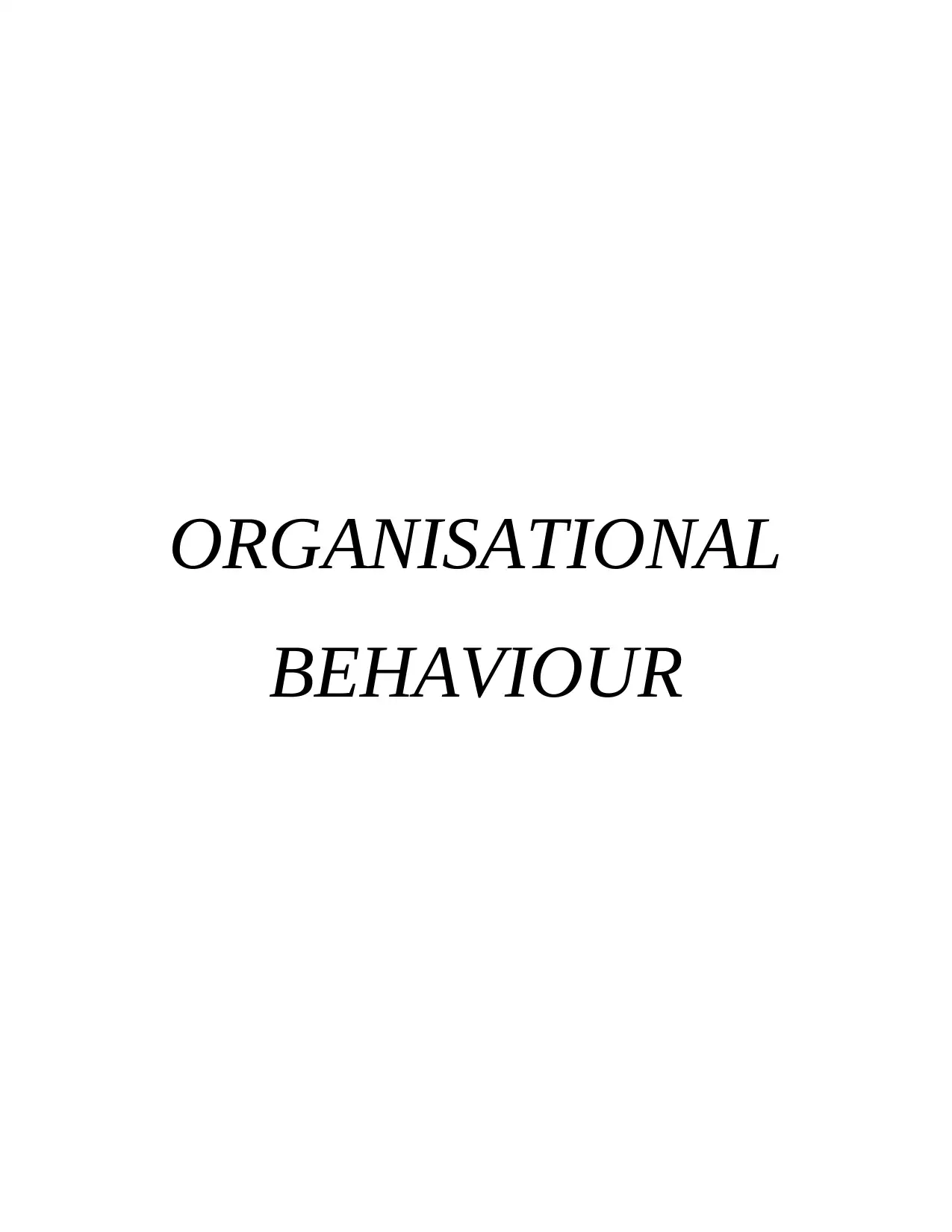
ORGANISATIONAL
BEHAVIOUR
BEHAVIOUR
Paraphrase This Document
Need a fresh take? Get an instant paraphrase of this document with our AI Paraphraser
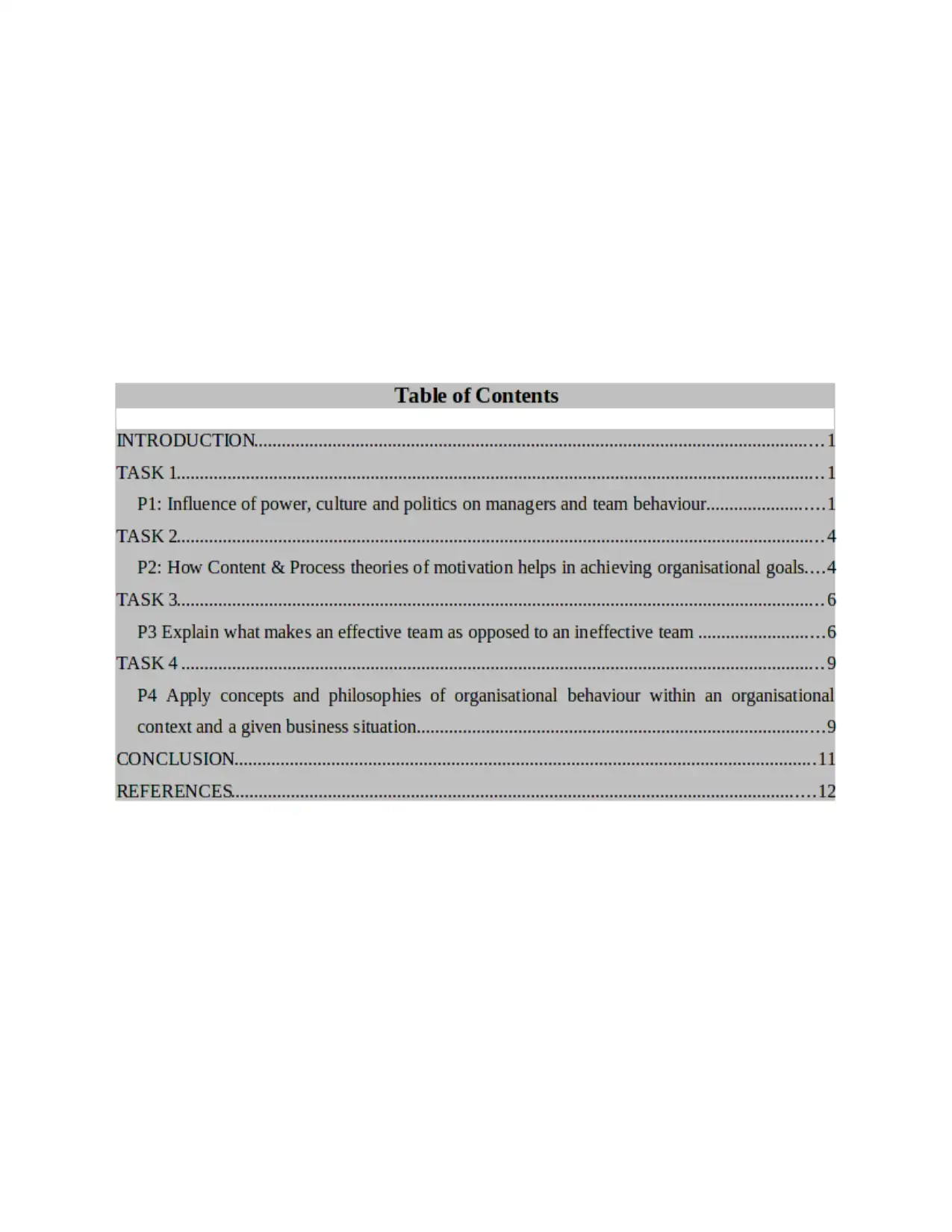
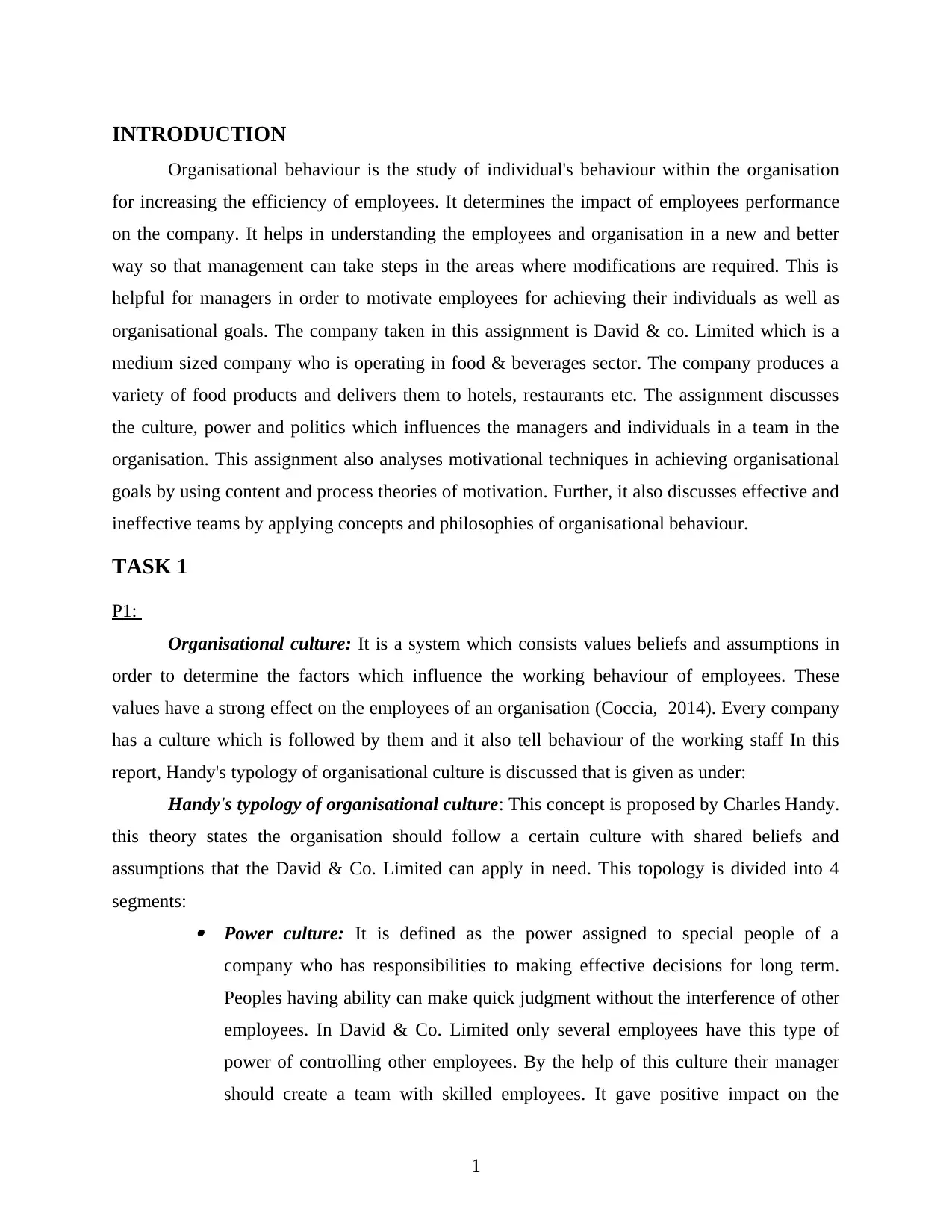
INTRODUCTION
Organisational behaviour is the study of individual's behaviour within the organisation
for increasing the efficiency of employees. It determines the impact of employees performance
on the company. It helps in understanding the employees and organisation in a new and better
way so that management can take steps in the areas where modifications are required. This is
helpful for managers in order to motivate employees for achieving their individuals as well as
organisational goals. The company taken in this assignment is David & co. Limited which is a
medium sized company who is operating in food & beverages sector. The company produces a
variety of food products and delivers them to hotels, restaurants etc. The assignment discusses
the culture, power and politics which influences the managers and individuals in a team in the
organisation. This assignment also analyses motivational techniques in achieving organisational
goals by using content and process theories of motivation. Further, it also discusses effective and
ineffective teams by applying concepts and philosophies of organisational behaviour.
TASK 1
P1:
Organisational culture: It is a system which consists values beliefs and assumptions in
order to determine the factors which influence the working behaviour of employees. These
values have a strong effect on the employees of an organisation (Coccia, 2014). Every company
has a culture which is followed by them and it also tell behaviour of the working staff In this
report, Handy's typology of organisational culture is discussed that is given as under:
Handy's typology of organisational culture: This concept is proposed by Charles Handy.
this theory states the organisation should follow a certain culture with shared beliefs and
assumptions that the David & Co. Limited can apply in need. This topology is divided into 4
segments:
Power culture: It is defined as the power assigned to special people of a
company who has responsibilities to making effective decisions for long term.
Peoples having ability can make quick judgment without the interference of other
employees. In David & Co. Limited only several employees have this type of
power of controlling other employees. By the help of this culture their manager
should create a team with skilled employees. It gave positive impact on the
1
Organisational behaviour is the study of individual's behaviour within the organisation
for increasing the efficiency of employees. It determines the impact of employees performance
on the company. It helps in understanding the employees and organisation in a new and better
way so that management can take steps in the areas where modifications are required. This is
helpful for managers in order to motivate employees for achieving their individuals as well as
organisational goals. The company taken in this assignment is David & co. Limited which is a
medium sized company who is operating in food & beverages sector. The company produces a
variety of food products and delivers them to hotels, restaurants etc. The assignment discusses
the culture, power and politics which influences the managers and individuals in a team in the
organisation. This assignment also analyses motivational techniques in achieving organisational
goals by using content and process theories of motivation. Further, it also discusses effective and
ineffective teams by applying concepts and philosophies of organisational behaviour.
TASK 1
P1:
Organisational culture: It is a system which consists values beliefs and assumptions in
order to determine the factors which influence the working behaviour of employees. These
values have a strong effect on the employees of an organisation (Coccia, 2014). Every company
has a culture which is followed by them and it also tell behaviour of the working staff In this
report, Handy's typology of organisational culture is discussed that is given as under:
Handy's typology of organisational culture: This concept is proposed by Charles Handy.
this theory states the organisation should follow a certain culture with shared beliefs and
assumptions that the David & Co. Limited can apply in need. This topology is divided into 4
segments:
Power culture: It is defined as the power assigned to special people of a
company who has responsibilities to making effective decisions for long term.
Peoples having ability can make quick judgment without the interference of other
employees. In David & Co. Limited only several employees have this type of
power of controlling other employees. By the help of this culture their manager
should create a team with skilled employees. It gave positive impact on the
1
⊘ This is a preview!⊘
Do you want full access?
Subscribe today to unlock all pages.

Trusted by 1+ million students worldwide
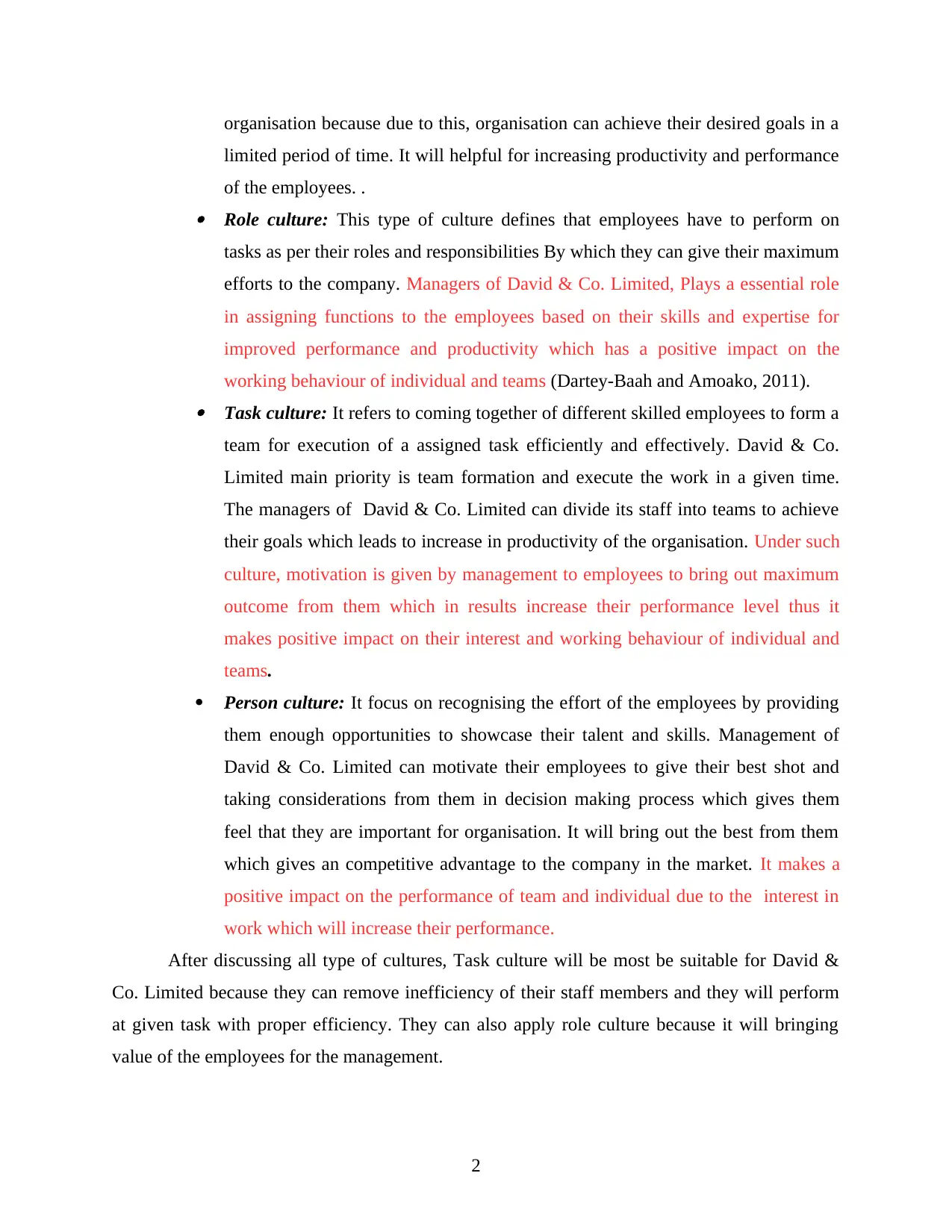
organisation because due to this, organisation can achieve their desired goals in a
limited period of time. It will helpful for increasing productivity and performance
of the employees. .
Role culture: This type of culture defines that employees have to perform on
tasks as per their roles and responsibilities By which they can give their maximum
efforts to the company. Managers of David & Co. Limited, Plays a essential role
in assigning functions to the employees based on their skills and expertise for
improved performance and productivity which has a positive impact on the
working behaviour of individual and teams (Dartey-Baah and Amoako, 2011).
Task culture: It refers to coming together of different skilled employees to form a
team for execution of a assigned task efficiently and effectively. David & Co.
Limited main priority is team formation and execute the work in a given time.
The managers of David & Co. Limited can divide its staff into teams to achieve
their goals which leads to increase in productivity of the organisation. Under such
culture, motivation is given by management to employees to bring out maximum
outcome from them which in results increase their performance level thus it
makes positive impact on their interest and working behaviour of individual and
teams.
Person culture: It focus on recognising the effort of the employees by providing
them enough opportunities to showcase their talent and skills. Management of
David & Co. Limited can motivate their employees to give their best shot and
taking considerations from them in decision making process which gives them
feel that they are important for organisation. It will bring out the best from them
which gives an competitive advantage to the company in the market. It makes a
positive impact on the performance of team and individual due to the interest in
work which will increase their performance.
After discussing all type of cultures, Task culture will be most be suitable for David &
Co. Limited because they can remove inefficiency of their staff members and they will perform
at given task with proper efficiency. They can also apply role culture because it will bringing
value of the employees for the management.
2
limited period of time. It will helpful for increasing productivity and performance
of the employees. .
Role culture: This type of culture defines that employees have to perform on
tasks as per their roles and responsibilities By which they can give their maximum
efforts to the company. Managers of David & Co. Limited, Plays a essential role
in assigning functions to the employees based on their skills and expertise for
improved performance and productivity which has a positive impact on the
working behaviour of individual and teams (Dartey-Baah and Amoako, 2011).
Task culture: It refers to coming together of different skilled employees to form a
team for execution of a assigned task efficiently and effectively. David & Co.
Limited main priority is team formation and execute the work in a given time.
The managers of David & Co. Limited can divide its staff into teams to achieve
their goals which leads to increase in productivity of the organisation. Under such
culture, motivation is given by management to employees to bring out maximum
outcome from them which in results increase their performance level thus it
makes positive impact on their interest and working behaviour of individual and
teams.
Person culture: It focus on recognising the effort of the employees by providing
them enough opportunities to showcase their talent and skills. Management of
David & Co. Limited can motivate their employees to give their best shot and
taking considerations from them in decision making process which gives them
feel that they are important for organisation. It will bring out the best from them
which gives an competitive advantage to the company in the market. It makes a
positive impact on the performance of team and individual due to the interest in
work which will increase their performance.
After discussing all type of cultures, Task culture will be most be suitable for David &
Co. Limited because they can remove inefficiency of their staff members and they will perform
at given task with proper efficiency. They can also apply role culture because it will bringing
value of the employees for the management.
2
Paraphrase This Document
Need a fresh take? Get an instant paraphrase of this document with our AI Paraphraser
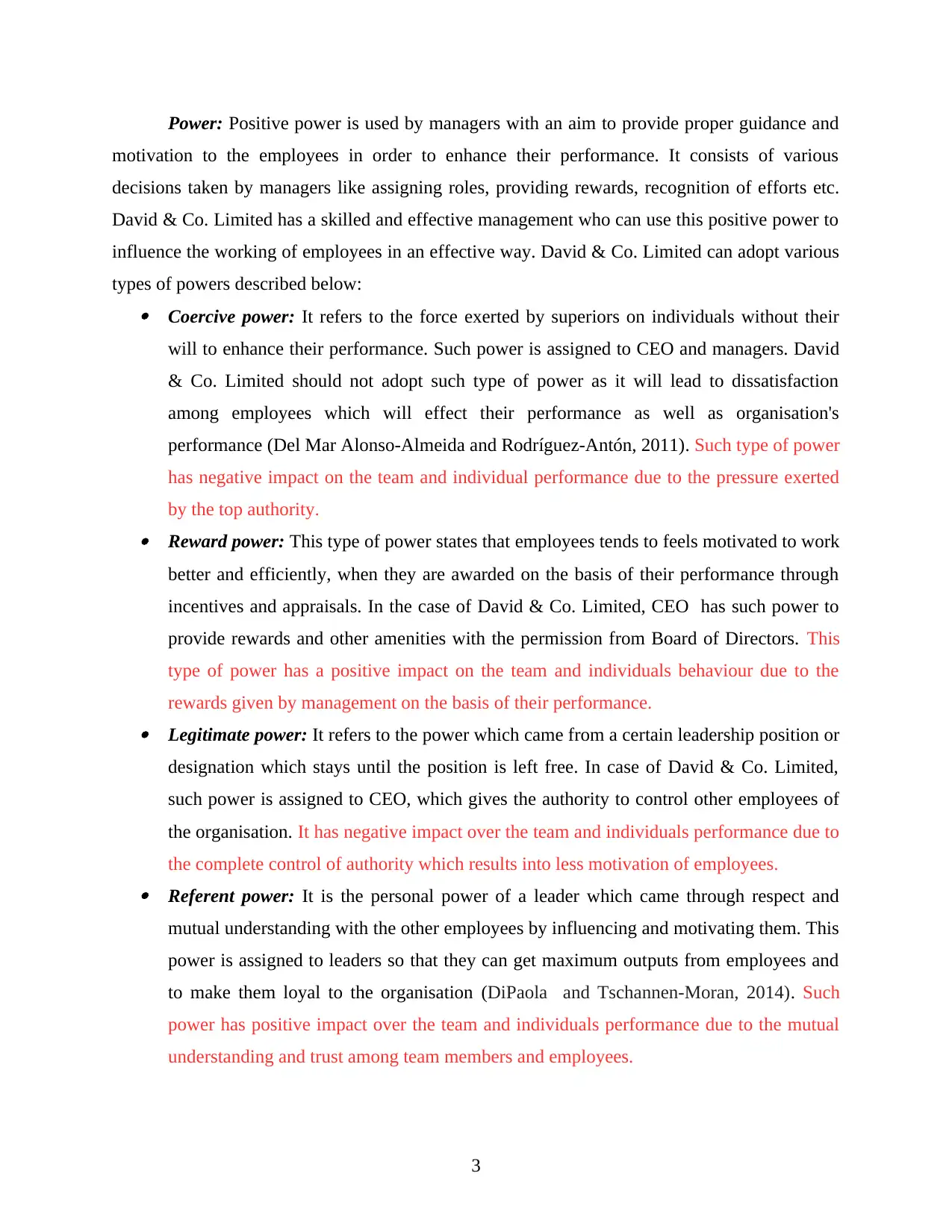
Power: Positive power is used by managers with an aim to provide proper guidance and
motivation to the employees in order to enhance their performance. It consists of various
decisions taken by managers like assigning roles, providing rewards, recognition of efforts etc.
David & Co. Limited has a skilled and effective management who can use this positive power to
influence the working of employees in an effective way. David & Co. Limited can adopt various
types of powers described below: Coercive power: It refers to the force exerted by superiors on individuals without their
will to enhance their performance. Such power is assigned to CEO and managers. David
& Co. Limited should not adopt such type of power as it will lead to dissatisfaction
among employees which will effect their performance as well as organisation's
performance (Del Mar Alonso-Almeida and Rodríguez-Antón, 2011). Such type of power
has negative impact on the team and individual performance due to the pressure exerted
by the top authority. Reward power: This type of power states that employees tends to feels motivated to work
better and efficiently, when they are awarded on the basis of their performance through
incentives and appraisals. In the case of David & Co. Limited, CEO has such power to
provide rewards and other amenities with the permission from Board of Directors. This
type of power has a positive impact on the team and individuals behaviour due to the
rewards given by management on the basis of their performance. Legitimate power: It refers to the power which came from a certain leadership position or
designation which stays until the position is left free. In case of David & Co. Limited,
such power is assigned to CEO, which gives the authority to control other employees of
the organisation. It has negative impact over the team and individuals performance due to
the complete control of authority which results into less motivation of employees. Referent power: It is the personal power of a leader which came through respect and
mutual understanding with the other employees by influencing and motivating them. This
power is assigned to leaders so that they can get maximum outputs from employees and
to make them loyal to the organisation (DiPaola and Tschannen-Moran, 2014). Such
power has positive impact over the team and individuals performance due to the mutual
understanding and trust among team members and employees.
3
motivation to the employees in order to enhance their performance. It consists of various
decisions taken by managers like assigning roles, providing rewards, recognition of efforts etc.
David & Co. Limited has a skilled and effective management who can use this positive power to
influence the working of employees in an effective way. David & Co. Limited can adopt various
types of powers described below: Coercive power: It refers to the force exerted by superiors on individuals without their
will to enhance their performance. Such power is assigned to CEO and managers. David
& Co. Limited should not adopt such type of power as it will lead to dissatisfaction
among employees which will effect their performance as well as organisation's
performance (Del Mar Alonso-Almeida and Rodríguez-Antón, 2011). Such type of power
has negative impact on the team and individual performance due to the pressure exerted
by the top authority. Reward power: This type of power states that employees tends to feels motivated to work
better and efficiently, when they are awarded on the basis of their performance through
incentives and appraisals. In the case of David & Co. Limited, CEO has such power to
provide rewards and other amenities with the permission from Board of Directors. This
type of power has a positive impact on the team and individuals behaviour due to the
rewards given by management on the basis of their performance. Legitimate power: It refers to the power which came from a certain leadership position or
designation which stays until the position is left free. In case of David & Co. Limited,
such power is assigned to CEO, which gives the authority to control other employees of
the organisation. It has negative impact over the team and individuals performance due to
the complete control of authority which results into less motivation of employees. Referent power: It is the personal power of a leader which came through respect and
mutual understanding with the other employees by influencing and motivating them. This
power is assigned to leaders so that they can get maximum outputs from employees and
to make them loyal to the organisation (DiPaola and Tschannen-Moran, 2014). Such
power has positive impact over the team and individuals performance due to the mutual
understanding and trust among team members and employees.
3
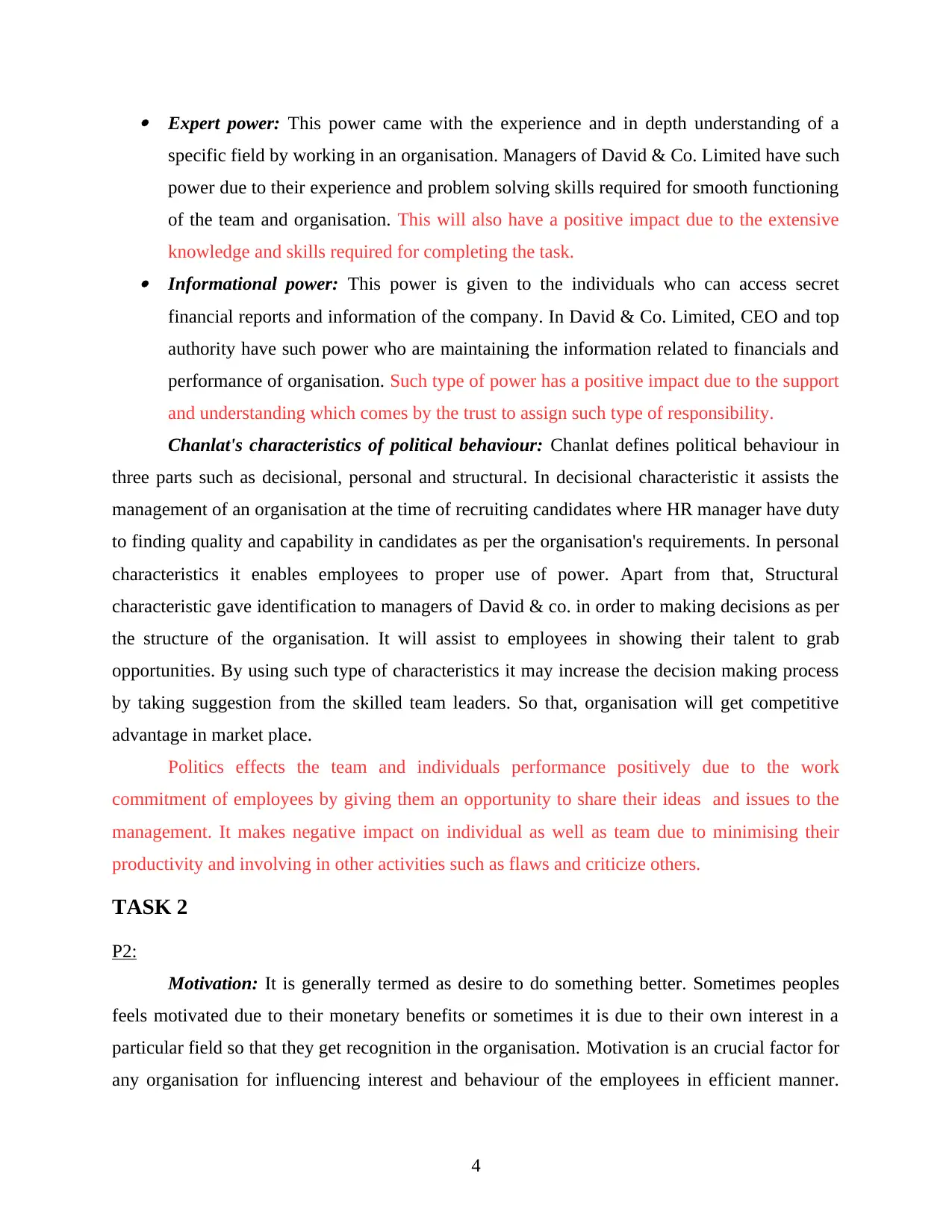
Expert power: This power came with the experience and in depth understanding of a
specific field by working in an organisation. Managers of David & Co. Limited have such
power due to their experience and problem solving skills required for smooth functioning
of the team and organisation. This will also have a positive impact due to the extensive
knowledge and skills required for completing the task. Informational power: This power is given to the individuals who can access secret
financial reports and information of the company. In David & Co. Limited, CEO and top
authority have such power who are maintaining the information related to financials and
performance of organisation. Such type of power has a positive impact due to the support
and understanding which comes by the trust to assign such type of responsibility.
Chanlat's characteristics of political behaviour: Chanlat defines political behaviour in
three parts such as decisional, personal and structural. In decisional characteristic it assists the
management of an organisation at the time of recruiting candidates where HR manager have duty
to finding quality and capability in candidates as per the organisation's requirements. In personal
characteristics it enables employees to proper use of power. Apart from that, Structural
characteristic gave identification to managers of David & co. in order to making decisions as per
the structure of the organisation. It will assist to employees in showing their talent to grab
opportunities. By using such type of characteristics it may increase the decision making process
by taking suggestion from the skilled team leaders. So that, organisation will get competitive
advantage in market place.
Politics effects the team and individuals performance positively due to the work
commitment of employees by giving them an opportunity to share their ideas and issues to the
management. It makes negative impact on individual as well as team due to minimising their
productivity and involving in other activities such as flaws and criticize others.
TASK 2
P2:
Motivation: It is generally termed as desire to do something better. Sometimes peoples
feels motivated due to their monetary benefits or sometimes it is due to their own interest in a
particular field so that they get recognition in the organisation. Motivation is an crucial factor for
any organisation for influencing interest and behaviour of the employees in efficient manner.
4
specific field by working in an organisation. Managers of David & Co. Limited have such
power due to their experience and problem solving skills required for smooth functioning
of the team and organisation. This will also have a positive impact due to the extensive
knowledge and skills required for completing the task. Informational power: This power is given to the individuals who can access secret
financial reports and information of the company. In David & Co. Limited, CEO and top
authority have such power who are maintaining the information related to financials and
performance of organisation. Such type of power has a positive impact due to the support
and understanding which comes by the trust to assign such type of responsibility.
Chanlat's characteristics of political behaviour: Chanlat defines political behaviour in
three parts such as decisional, personal and structural. In decisional characteristic it assists the
management of an organisation at the time of recruiting candidates where HR manager have duty
to finding quality and capability in candidates as per the organisation's requirements. In personal
characteristics it enables employees to proper use of power. Apart from that, Structural
characteristic gave identification to managers of David & co. in order to making decisions as per
the structure of the organisation. It will assist to employees in showing their talent to grab
opportunities. By using such type of characteristics it may increase the decision making process
by taking suggestion from the skilled team leaders. So that, organisation will get competitive
advantage in market place.
Politics effects the team and individuals performance positively due to the work
commitment of employees by giving them an opportunity to share their ideas and issues to the
management. It makes negative impact on individual as well as team due to minimising their
productivity and involving in other activities such as flaws and criticize others.
TASK 2
P2:
Motivation: It is generally termed as desire to do something better. Sometimes peoples
feels motivated due to their monetary benefits or sometimes it is due to their own interest in a
particular field so that they get recognition in the organisation. Motivation is an crucial factor for
any organisation for influencing interest and behaviour of the employees in efficient manner.
4
⊘ This is a preview!⊘
Do you want full access?
Subscribe today to unlock all pages.

Trusted by 1+ million students worldwide
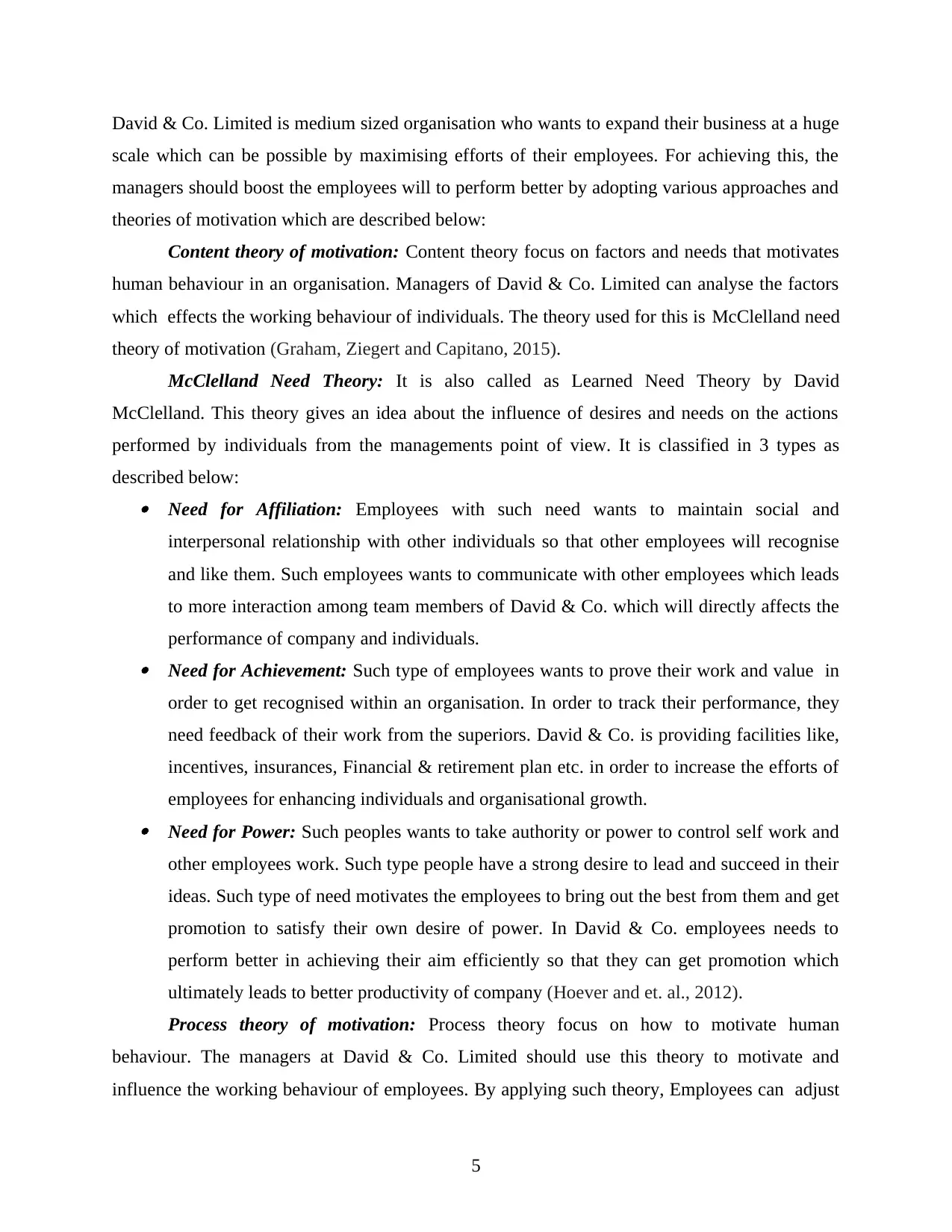
David & Co. Limited is medium sized organisation who wants to expand their business at a huge
scale which can be possible by maximising efforts of their employees. For achieving this, the
managers should boost the employees will to perform better by adopting various approaches and
theories of motivation which are described below:
Content theory of motivation: Content theory focus on factors and needs that motivates
human behaviour in an organisation. Managers of David & Co. Limited can analyse the factors
which effects the working behaviour of individuals. The theory used for this is McClelland need
theory of motivation (Graham, Ziegert and Capitano, 2015).
McClelland Need Theory: It is also called as Learned Need Theory by David
McClelland. This theory gives an idea about the influence of desires and needs on the actions
performed by individuals from the managements point of view. It is classified in 3 types as
described below: Need for Affiliation: Employees with such need wants to maintain social and
interpersonal relationship with other individuals so that other employees will recognise
and like them. Such employees wants to communicate with other employees which leads
to more interaction among team members of David & Co. which will directly affects the
performance of company and individuals. Need for Achievement: Such type of employees wants to prove their work and value in
order to get recognised within an organisation. In order to track their performance, they
need feedback of their work from the superiors. David & Co. is providing facilities like,
incentives, insurances, Financial & retirement plan etc. in order to increase the efforts of
employees for enhancing individuals and organisational growth. Need for Power: Such peoples wants to take authority or power to control self work and
other employees work. Such type people have a strong desire to lead and succeed in their
ideas. Such type of need motivates the employees to bring out the best from them and get
promotion to satisfy their own desire of power. In David & Co. employees needs to
perform better in achieving their aim efficiently so that they can get promotion which
ultimately leads to better productivity of company (Hoever and et. al., 2012).
Process theory of motivation: Process theory focus on how to motivate human
behaviour. The managers at David & Co. Limited should use this theory to motivate and
influence the working behaviour of employees. By applying such theory, Employees can adjust
5
scale which can be possible by maximising efforts of their employees. For achieving this, the
managers should boost the employees will to perform better by adopting various approaches and
theories of motivation which are described below:
Content theory of motivation: Content theory focus on factors and needs that motivates
human behaviour in an organisation. Managers of David & Co. Limited can analyse the factors
which effects the working behaviour of individuals. The theory used for this is McClelland need
theory of motivation (Graham, Ziegert and Capitano, 2015).
McClelland Need Theory: It is also called as Learned Need Theory by David
McClelland. This theory gives an idea about the influence of desires and needs on the actions
performed by individuals from the managements point of view. It is classified in 3 types as
described below: Need for Affiliation: Employees with such need wants to maintain social and
interpersonal relationship with other individuals so that other employees will recognise
and like them. Such employees wants to communicate with other employees which leads
to more interaction among team members of David & Co. which will directly affects the
performance of company and individuals. Need for Achievement: Such type of employees wants to prove their work and value in
order to get recognised within an organisation. In order to track their performance, they
need feedback of their work from the superiors. David & Co. is providing facilities like,
incentives, insurances, Financial & retirement plan etc. in order to increase the efforts of
employees for enhancing individuals and organisational growth. Need for Power: Such peoples wants to take authority or power to control self work and
other employees work. Such type people have a strong desire to lead and succeed in their
ideas. Such type of need motivates the employees to bring out the best from them and get
promotion to satisfy their own desire of power. In David & Co. employees needs to
perform better in achieving their aim efficiently so that they can get promotion which
ultimately leads to better productivity of company (Hoever and et. al., 2012).
Process theory of motivation: Process theory focus on how to motivate human
behaviour. The managers at David & Co. Limited should use this theory to motivate and
influence the working behaviour of employees. By applying such theory, Employees can adjust
5
Paraphrase This Document
Need a fresh take? Get an instant paraphrase of this document with our AI Paraphraser
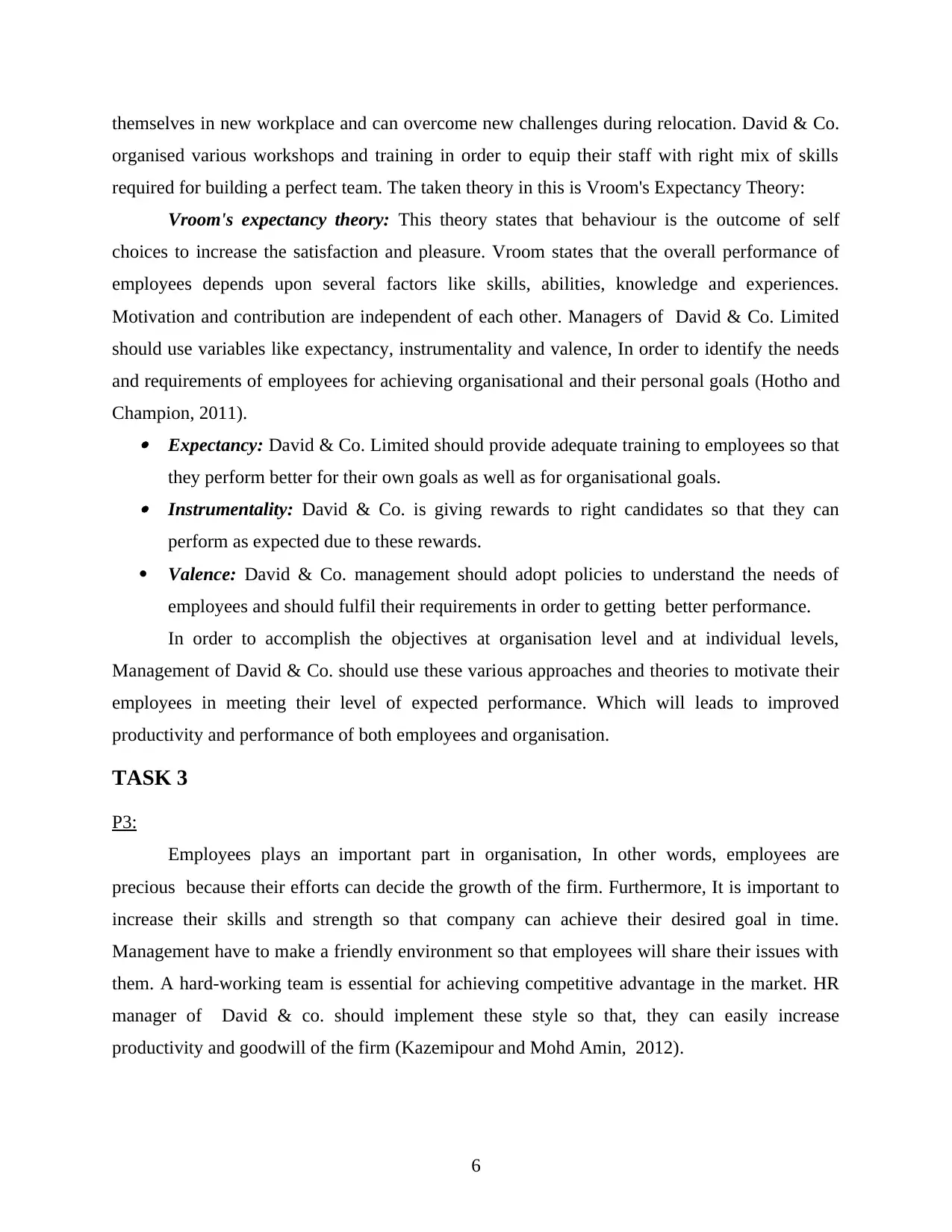
themselves in new workplace and can overcome new challenges during relocation. David & Co.
organised various workshops and training in order to equip their staff with right mix of skills
required for building a perfect team. The taken theory in this is Vroom's Expectancy Theory:
Vroom's expectancy theory: This theory states that behaviour is the outcome of self
choices to increase the satisfaction and pleasure. Vroom states that the overall performance of
employees depends upon several factors like skills, abilities, knowledge and experiences.
Motivation and contribution are independent of each other. Managers of David & Co. Limited
should use variables like expectancy, instrumentality and valence, In order to identify the needs
and requirements of employees for achieving organisational and their personal goals (Hotho and
Champion, 2011). Expectancy: David & Co. Limited should provide adequate training to employees so that
they perform better for their own goals as well as for organisational goals. Instrumentality: David & Co. is giving rewards to right candidates so that they can
perform as expected due to these rewards.
Valence: David & Co. management should adopt policies to understand the needs of
employees and should fulfil their requirements in order to getting better performance.
In order to accomplish the objectives at organisation level and at individual levels,
Management of David & Co. should use these various approaches and theories to motivate their
employees in meeting their level of expected performance. Which will leads to improved
productivity and performance of both employees and organisation.
TASK 3
P3:
Employees plays an important part in organisation, In other words, employees are
precious because their efforts can decide the growth of the firm. Furthermore, It is important to
increase their skills and strength so that company can achieve their desired goal in time.
Management have to make a friendly environment so that employees will share their issues with
them. A hard-working team is essential for achieving competitive advantage in the market. HR
manager of David & co. should implement these style so that, they can easily increase
productivity and goodwill of the firm (Kazemipour and Mohd Amin, 2012).
6
organised various workshops and training in order to equip their staff with right mix of skills
required for building a perfect team. The taken theory in this is Vroom's Expectancy Theory:
Vroom's expectancy theory: This theory states that behaviour is the outcome of self
choices to increase the satisfaction and pleasure. Vroom states that the overall performance of
employees depends upon several factors like skills, abilities, knowledge and experiences.
Motivation and contribution are independent of each other. Managers of David & Co. Limited
should use variables like expectancy, instrumentality and valence, In order to identify the needs
and requirements of employees for achieving organisational and their personal goals (Hotho and
Champion, 2011). Expectancy: David & Co. Limited should provide adequate training to employees so that
they perform better for their own goals as well as for organisational goals. Instrumentality: David & Co. is giving rewards to right candidates so that they can
perform as expected due to these rewards.
Valence: David & Co. management should adopt policies to understand the needs of
employees and should fulfil their requirements in order to getting better performance.
In order to accomplish the objectives at organisation level and at individual levels,
Management of David & Co. should use these various approaches and theories to motivate their
employees in meeting their level of expected performance. Which will leads to improved
productivity and performance of both employees and organisation.
TASK 3
P3:
Employees plays an important part in organisation, In other words, employees are
precious because their efforts can decide the growth of the firm. Furthermore, It is important to
increase their skills and strength so that company can achieve their desired goal in time.
Management have to make a friendly environment so that employees will share their issues with
them. A hard-working team is essential for achieving competitive advantage in the market. HR
manager of David & co. should implement these style so that, they can easily increase
productivity and goodwill of the firm (Kazemipour and Mohd Amin, 2012).
6
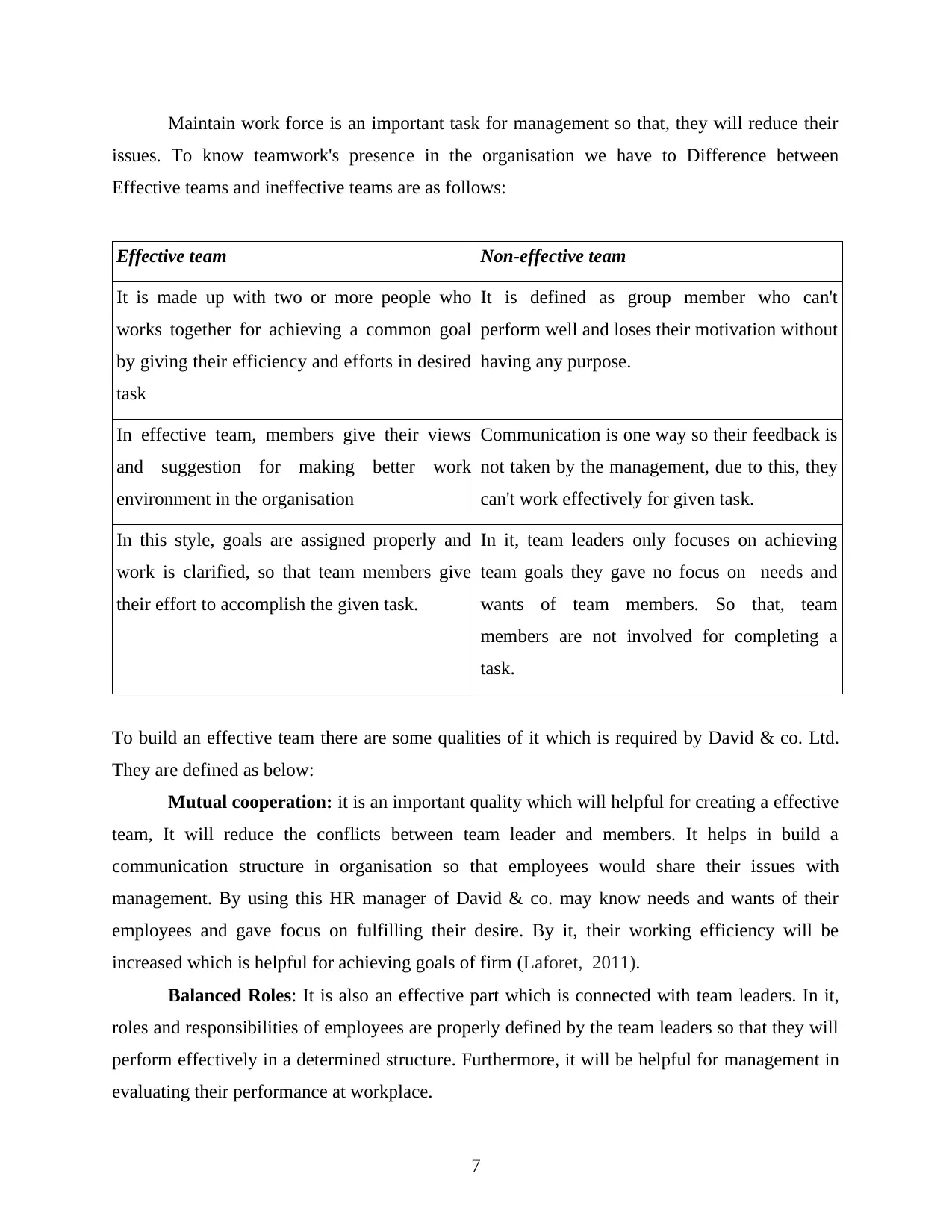
Maintain work force is an important task for management so that, they will reduce their
issues. To know teamwork's presence in the organisation we have to Difference between
Effective teams and ineffective teams are as follows:
Effective team Non-effective team
It is made up with two or more people who
works together for achieving a common goal
by giving their efficiency and efforts in desired
task
It is defined as group member who can't
perform well and loses their motivation without
having any purpose.
In effective team, members give their views
and suggestion for making better work
environment in the organisation
Communication is one way so their feedback is
not taken by the management, due to this, they
can't work effectively for given task.
In this style, goals are assigned properly and
work is clarified, so that team members give
their effort to accomplish the given task.
In it, team leaders only focuses on achieving
team goals they gave no focus on needs and
wants of team members. So that, team
members are not involved for completing a
task.
To build an effective team there are some qualities of it which is required by David & co. Ltd.
They are defined as below:
Mutual cooperation: it is an important quality which will helpful for creating a effective
team, It will reduce the conflicts between team leader and members. It helps in build a
communication structure in organisation so that employees would share their issues with
management. By using this HR manager of David & co. may know needs and wants of their
employees and gave focus on fulfilling their desire. By it, their working efficiency will be
increased which is helpful for achieving goals of firm (Laforet, 2011).
Balanced Roles: It is also an effective part which is connected with team leaders. In it,
roles and responsibilities of employees are properly defined by the team leaders so that they will
perform effectively in a determined structure. Furthermore, it will be helpful for management in
evaluating their performance at workplace.
7
issues. To know teamwork's presence in the organisation we have to Difference between
Effective teams and ineffective teams are as follows:
Effective team Non-effective team
It is made up with two or more people who
works together for achieving a common goal
by giving their efficiency and efforts in desired
task
It is defined as group member who can't
perform well and loses their motivation without
having any purpose.
In effective team, members give their views
and suggestion for making better work
environment in the organisation
Communication is one way so their feedback is
not taken by the management, due to this, they
can't work effectively for given task.
In this style, goals are assigned properly and
work is clarified, so that team members give
their effort to accomplish the given task.
In it, team leaders only focuses on achieving
team goals they gave no focus on needs and
wants of team members. So that, team
members are not involved for completing a
task.
To build an effective team there are some qualities of it which is required by David & co. Ltd.
They are defined as below:
Mutual cooperation: it is an important quality which will helpful for creating a effective
team, It will reduce the conflicts between team leader and members. It helps in build a
communication structure in organisation so that employees would share their issues with
management. By using this HR manager of David & co. may know needs and wants of their
employees and gave focus on fulfilling their desire. By it, their working efficiency will be
increased which is helpful for achieving goals of firm (Laforet, 2011).
Balanced Roles: It is also an effective part which is connected with team leaders. In it,
roles and responsibilities of employees are properly defined by the team leaders so that they will
perform effectively in a determined structure. Furthermore, it will be helpful for management in
evaluating their performance at workplace.
7
⊘ This is a preview!⊘
Do you want full access?
Subscribe today to unlock all pages.

Trusted by 1+ million students worldwide
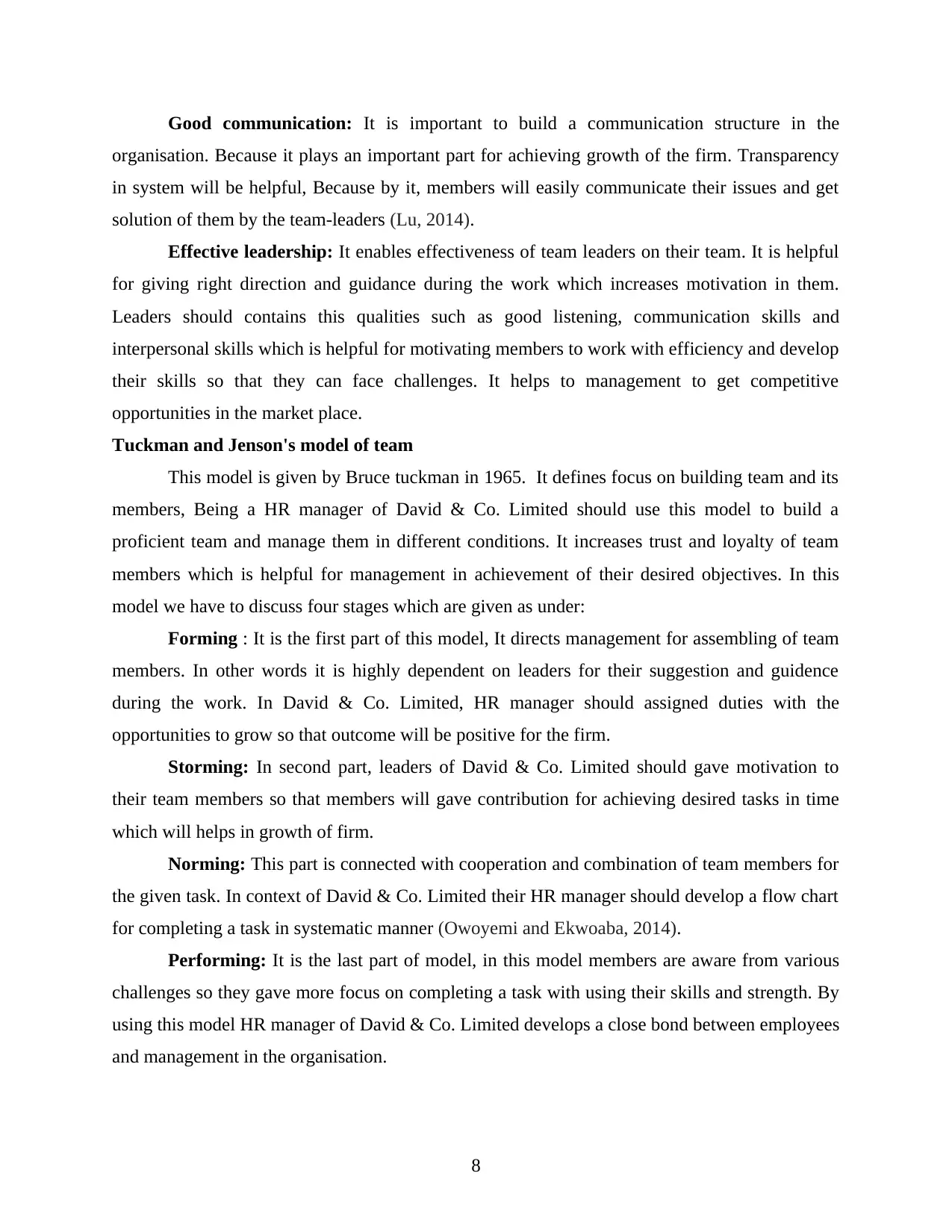
Good communication: It is important to build a communication structure in the
organisation. Because it plays an important part for achieving growth of the firm. Transparency
in system will be helpful, Because by it, members will easily communicate their issues and get
solution of them by the team-leaders (Lu, 2014).
Effective leadership: It enables effectiveness of team leaders on their team. It is helpful
for giving right direction and guidance during the work which increases motivation in them.
Leaders should contains this qualities such as good listening, communication skills and
interpersonal skills which is helpful for motivating members to work with efficiency and develop
their skills so that they can face challenges. It helps to management to get competitive
opportunities in the market place.
Tuckman and Jenson's model of team
This model is given by Bruce tuckman in 1965. It defines focus on building team and its
members, Being a HR manager of David & Co. Limited should use this model to build a
proficient team and manage them in different conditions. It increases trust and loyalty of team
members which is helpful for management in achievement of their desired objectives. In this
model we have to discuss four stages which are given as under:
Forming : It is the first part of this model, It directs management for assembling of team
members. In other words it is highly dependent on leaders for their suggestion and guidence
during the work. In David & Co. Limited, HR manager should assigned duties with the
opportunities to grow so that outcome will be positive for the firm.
Storming: In second part, leaders of David & Co. Limited should gave motivation to
their team members so that members will gave contribution for achieving desired tasks in time
which will helps in growth of firm.
Norming: This part is connected with cooperation and combination of team members for
the given task. In context of David & Co. Limited their HR manager should develop a flow chart
for completing a task in systematic manner (Owoyemi and Ekwoaba, 2014).
Performing: It is the last part of model, in this model members are aware from various
challenges so they gave more focus on completing a task with using their skills and strength. By
using this model HR manager of David & Co. Limited develops a close bond between employees
and management in the organisation.
8
organisation. Because it plays an important part for achieving growth of the firm. Transparency
in system will be helpful, Because by it, members will easily communicate their issues and get
solution of them by the team-leaders (Lu, 2014).
Effective leadership: It enables effectiveness of team leaders on their team. It is helpful
for giving right direction and guidance during the work which increases motivation in them.
Leaders should contains this qualities such as good listening, communication skills and
interpersonal skills which is helpful for motivating members to work with efficiency and develop
their skills so that they can face challenges. It helps to management to get competitive
opportunities in the market place.
Tuckman and Jenson's model of team
This model is given by Bruce tuckman in 1965. It defines focus on building team and its
members, Being a HR manager of David & Co. Limited should use this model to build a
proficient team and manage them in different conditions. It increases trust and loyalty of team
members which is helpful for management in achievement of their desired objectives. In this
model we have to discuss four stages which are given as under:
Forming : It is the first part of this model, It directs management for assembling of team
members. In other words it is highly dependent on leaders for their suggestion and guidence
during the work. In David & Co. Limited, HR manager should assigned duties with the
opportunities to grow so that outcome will be positive for the firm.
Storming: In second part, leaders of David & Co. Limited should gave motivation to
their team members so that members will gave contribution for achieving desired tasks in time
which will helps in growth of firm.
Norming: This part is connected with cooperation and combination of team members for
the given task. In context of David & Co. Limited their HR manager should develop a flow chart
for completing a task in systematic manner (Owoyemi and Ekwoaba, 2014).
Performing: It is the last part of model, in this model members are aware from various
challenges so they gave more focus on completing a task with using their skills and strength. By
using this model HR manager of David & Co. Limited develops a close bond between employees
and management in the organisation.
8
Paraphrase This Document
Need a fresh take? Get an instant paraphrase of this document with our AI Paraphraser
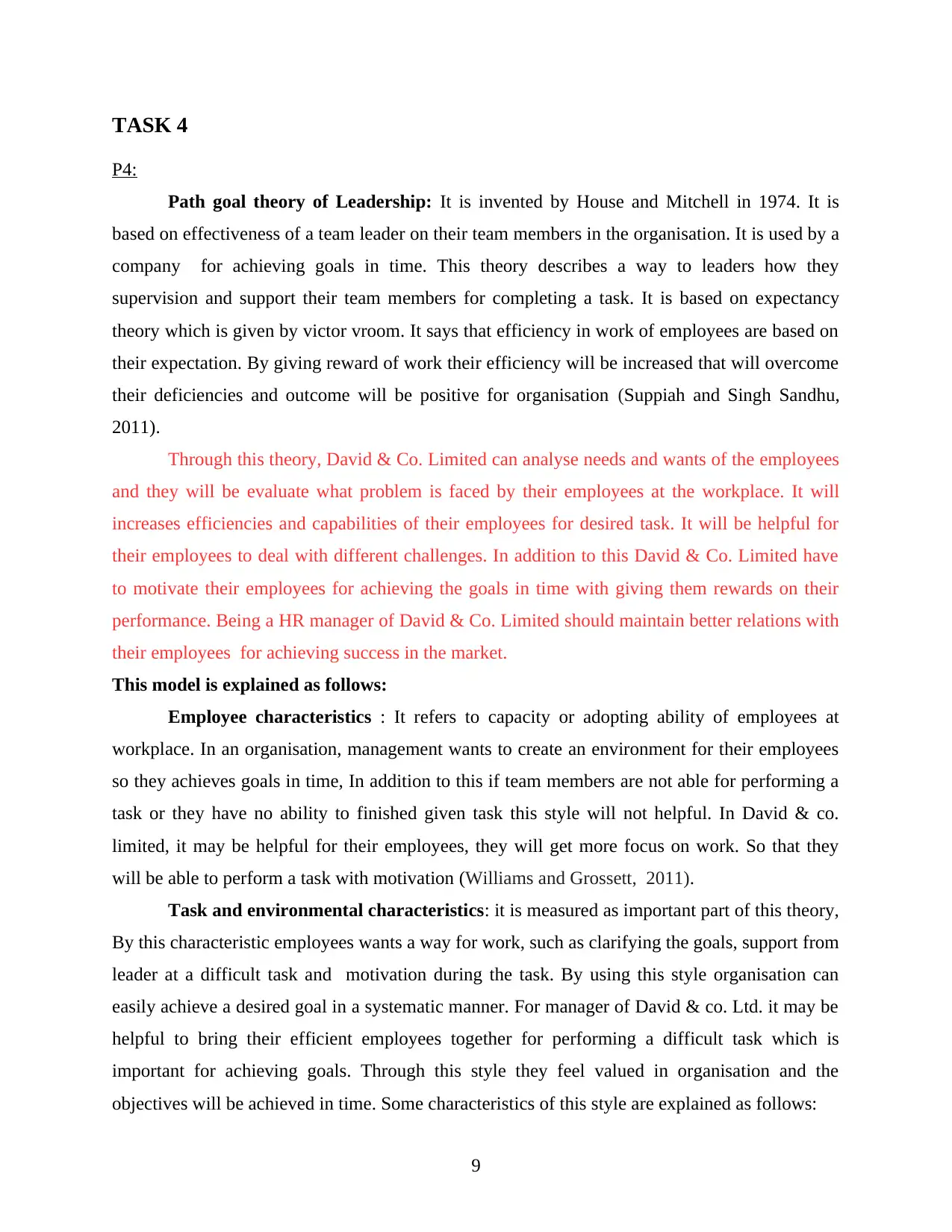
TASK 4
P4:
Path goal theory of Leadership: It is invented by House and Mitchell in 1974. It is
based on effectiveness of a team leader on their team members in the organisation. It is used by a
company for achieving goals in time. This theory describes a way to leaders how they
supervision and support their team members for completing a task. It is based on expectancy
theory which is given by victor vroom. It says that efficiency in work of employees are based on
their expectation. By giving reward of work their efficiency will be increased that will overcome
their deficiencies and outcome will be positive for organisation (Suppiah and Singh Sandhu,
2011).
Through this theory, David & Co. Limited can analyse needs and wants of the employees
and they will be evaluate what problem is faced by their employees at the workplace. It will
increases efficiencies and capabilities of their employees for desired task. It will be helpful for
their employees to deal with different challenges. In addition to this David & Co. Limited have
to motivate their employees for achieving the goals in time with giving them rewards on their
performance. Being a HR manager of David & Co. Limited should maintain better relations with
their employees for achieving success in the market.
This model is explained as follows:
Employee characteristics : It refers to capacity or adopting ability of employees at
workplace. In an organisation, management wants to create an environment for their employees
so they achieves goals in time, In addition to this if team members are not able for performing a
task or they have no ability to finished given task this style will not helpful. In David & co.
limited, it may be helpful for their employees, they will get more focus on work. So that they
will be able to perform a task with motivation (Williams and Grossett, 2011).
Task and environmental characteristics: it is measured as important part of this theory,
By this characteristic employees wants a way for work, such as clarifying the goals, support from
leader at a difficult task and motivation during the task. By using this style organisation can
easily achieve a desired goal in a systematic manner. For manager of David & co. Ltd. it may be
helpful to bring their efficient employees together for performing a difficult task which is
important for achieving goals. Through this style they feel valued in organisation and the
objectives will be achieved in time. Some characteristics of this style are explained as follows:
9
P4:
Path goal theory of Leadership: It is invented by House and Mitchell in 1974. It is
based on effectiveness of a team leader on their team members in the organisation. It is used by a
company for achieving goals in time. This theory describes a way to leaders how they
supervision and support their team members for completing a task. It is based on expectancy
theory which is given by victor vroom. It says that efficiency in work of employees are based on
their expectation. By giving reward of work their efficiency will be increased that will overcome
their deficiencies and outcome will be positive for organisation (Suppiah and Singh Sandhu,
2011).
Through this theory, David & Co. Limited can analyse needs and wants of the employees
and they will be evaluate what problem is faced by their employees at the workplace. It will
increases efficiencies and capabilities of their employees for desired task. It will be helpful for
their employees to deal with different challenges. In addition to this David & Co. Limited have
to motivate their employees for achieving the goals in time with giving them rewards on their
performance. Being a HR manager of David & Co. Limited should maintain better relations with
their employees for achieving success in the market.
This model is explained as follows:
Employee characteristics : It refers to capacity or adopting ability of employees at
workplace. In an organisation, management wants to create an environment for their employees
so they achieves goals in time, In addition to this if team members are not able for performing a
task or they have no ability to finished given task this style will not helpful. In David & co.
limited, it may be helpful for their employees, they will get more focus on work. So that they
will be able to perform a task with motivation (Williams and Grossett, 2011).
Task and environmental characteristics: it is measured as important part of this theory,
By this characteristic employees wants a way for work, such as clarifying the goals, support from
leader at a difficult task and motivation during the task. By using this style organisation can
easily achieve a desired goal in a systematic manner. For manager of David & co. Ltd. it may be
helpful to bring their efficient employees together for performing a difficult task which is
important for achieving goals. Through this style they feel valued in organisation and the
objectives will be achieved in time. Some characteristics of this style are explained as follows:
9
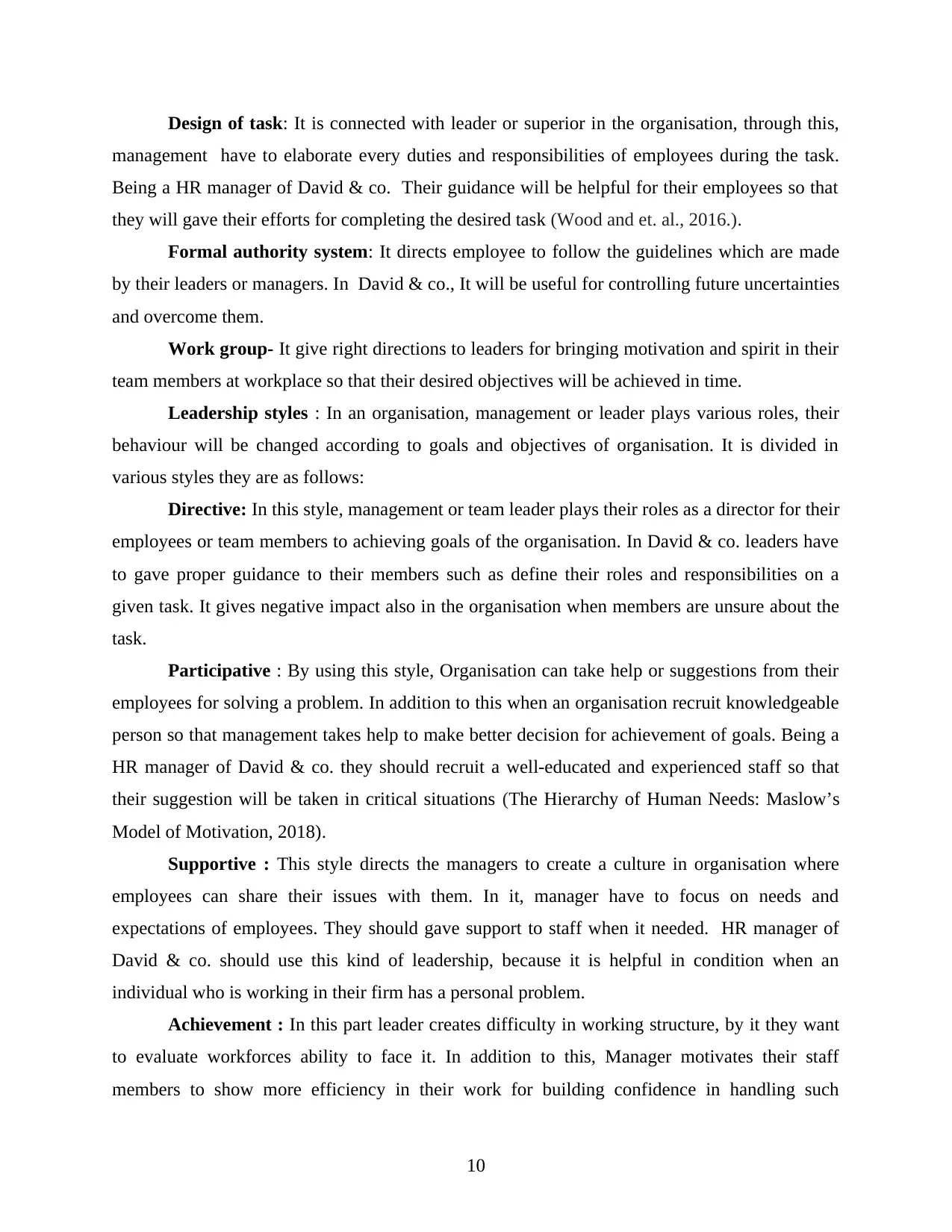
Design of task: It is connected with leader or superior in the organisation, through this,
management have to elaborate every duties and responsibilities of employees during the task.
Being a HR manager of David & co. Their guidance will be helpful for their employees so that
they will gave their efforts for completing the desired task (Wood and et. al., 2016.).
Formal authority system: It directs employee to follow the guidelines which are made
by their leaders or managers. In David & co., It will be useful for controlling future uncertainties
and overcome them.
Work group- It give right directions to leaders for bringing motivation and spirit in their
team members at workplace so that their desired objectives will be achieved in time.
Leadership styles : In an organisation, management or leader plays various roles, their
behaviour will be changed according to goals and objectives of organisation. It is divided in
various styles they are as follows:
Directive: In this style, management or team leader plays their roles as a director for their
employees or team members to achieving goals of the organisation. In David & co. leaders have
to gave proper guidance to their members such as define their roles and responsibilities on a
given task. It gives negative impact also in the organisation when members are unsure about the
task.
Participative : By using this style, Organisation can take help or suggestions from their
employees for solving a problem. In addition to this when an organisation recruit knowledgeable
person so that management takes help to make better decision for achievement of goals. Being a
HR manager of David & co. they should recruit a well-educated and experienced staff so that
their suggestion will be taken in critical situations (The Hierarchy of Human Needs: Maslow’s
Model of Motivation, 2018).
Supportive : This style directs the managers to create a culture in organisation where
employees can share their issues with them. In it, manager have to focus on needs and
expectations of employees. They should gave support to staff when it needed. HR manager of
David & co. should use this kind of leadership, because it is helpful in condition when an
individual who is working in their firm has a personal problem.
Achievement : In this part leader creates difficulty in working structure, by it they want
to evaluate workforces ability to face it. In addition to this, Manager motivates their staff
members to show more efficiency in their work for building confidence in handling such
10
management have to elaborate every duties and responsibilities of employees during the task.
Being a HR manager of David & co. Their guidance will be helpful for their employees so that
they will gave their efforts for completing the desired task (Wood and et. al., 2016.).
Formal authority system: It directs employee to follow the guidelines which are made
by their leaders or managers. In David & co., It will be useful for controlling future uncertainties
and overcome them.
Work group- It give right directions to leaders for bringing motivation and spirit in their
team members at workplace so that their desired objectives will be achieved in time.
Leadership styles : In an organisation, management or leader plays various roles, their
behaviour will be changed according to goals and objectives of organisation. It is divided in
various styles they are as follows:
Directive: In this style, management or team leader plays their roles as a director for their
employees or team members to achieving goals of the organisation. In David & co. leaders have
to gave proper guidance to their members such as define their roles and responsibilities on a
given task. It gives negative impact also in the organisation when members are unsure about the
task.
Participative : By using this style, Organisation can take help or suggestions from their
employees for solving a problem. In addition to this when an organisation recruit knowledgeable
person so that management takes help to make better decision for achievement of goals. Being a
HR manager of David & co. they should recruit a well-educated and experienced staff so that
their suggestion will be taken in critical situations (The Hierarchy of Human Needs: Maslow’s
Model of Motivation, 2018).
Supportive : This style directs the managers to create a culture in organisation where
employees can share their issues with them. In it, manager have to focus on needs and
expectations of employees. They should gave support to staff when it needed. HR manager of
David & co. should use this kind of leadership, because it is helpful in condition when an
individual who is working in their firm has a personal problem.
Achievement : In this part leader creates difficulty in working structure, by it they want
to evaluate workforces ability to face it. In addition to this, Manager motivates their staff
members to show more efficiency in their work for building confidence in handling such
10
⊘ This is a preview!⊘
Do you want full access?
Subscribe today to unlock all pages.

Trusted by 1+ million students worldwide
1 out of 15
Related Documents
Your All-in-One AI-Powered Toolkit for Academic Success.
+13062052269
info@desklib.com
Available 24*7 on WhatsApp / Email
![[object Object]](/_next/static/media/star-bottom.7253800d.svg)
Unlock your academic potential
Copyright © 2020–2026 A2Z Services. All Rights Reserved. Developed and managed by ZUCOL.





